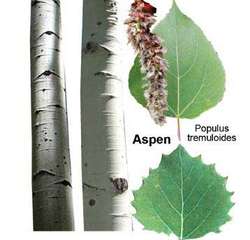aspen
any of several trees of the salicaceous genus Populus, such as P. tremula of Europe, in which the leaves are attached to the stem by long flattened stalks so that they quiver in the wind
Collins Discovery Encyclopedia, 1st edition © HarperCollins Publishers 2005
aspen
related to Poplar Tree, also called “Quaking Aspen” for how it sways in the wind. Whitish bark, which contains salicylin, the natural aspirin also found in willow trees for pain relief and headaches. Inner bark tea used for colds, fever, pain, stomach problems, kidney, bladder, urinary issues, venereal disease, rheumatism, arthritis, diarrhea, worms, menstrual bleeding, anti-inflammatory.
Edible Plant Guide © 2012 Markus Rothkranz
aspen
[′as·pən] (botany)
Any of several species of poplars (Populus) characterized by weak, flattened leaf stalks which cause the leaves to flutter in the slightest breeze.
McGraw-Hill Dictionary of Scientific & Technical Terms, 6E, Copyright © 2003 by The McGraw-Hill Companies, Inc.
ASPEN
(language)A toy language for teaching compiler
construction.
["ASPEN Language Specifications", T.R. Wilcox, SIGPLAN Notices 12(11):70-87, Nov 1977].
["ASPEN Language Specifications", T.R. Wilcox, SIGPLAN Notices 12(11):70-87, Nov 1977].
This article is provided by FOLDOC - Free Online Dictionary of Computing (foldoc.org)
Aspen
(Aspen Technology, Inc., Burlington, MA, www.aspentec.com) A leading provider of smart manufacturing and supply chain management software and services for the process industries, which includes chemicals, metals and minerals, pulp and paper, electric power and consumer packaged goods. Aspen was founded in 1981 to commercialize technology developed by the Advanced System for Process Engineering (ASPEN) at MIT. From 1976 to 1981, the ASPEN project was funded by the U.S. Department of Energy and a group of more than 50 industrial participants, after which it went public.Copyright © 1981-2025 by The Computer Language Company Inc. All Rights reserved. THIS DEFINITION IS FOR PERSONAL USE ONLY. All other reproduction is strictly prohibited without permission from the publisher.
